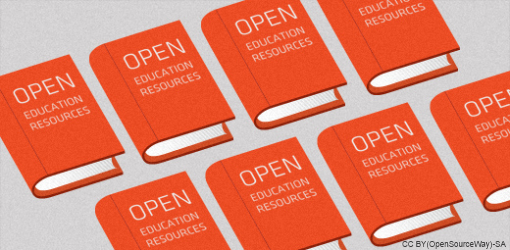Open Educational Resources
by Digital Rights LAC on June 10, 2013
Besides the practicality it could bring to the authors, free licensing can also contribute to promote the most important constitutional rights in the scope of cultural production: the access to culture and the access to knowledge.
Por Eduardo Magrani y Pedro Belchior, Centro de Tecnología y Sociedad.
Open Educational Resources (OER) were mentioned for the first time in 2002, in a UNESCO conference. Participants at that forum defined the OER as a vast provision of educational resources, enabled by information and communication technologies, for consultation, use and adaptation, facilitated by free licensing.
Given the limitation of copyright protection, the transaction costs needed for the legal distribution of works are normally too high, creating obstacles to the practice and leaving both the author and the user in a situation of juridical instability, since it isn’t clear how the available works could be legally used. Regarded as a possible way to solve this problem, free licenses, that are nothing more than standard use licenses, could specify which forms of utilization are allowed.
Open Educational Resources are theoretically digitalized materials offered freely and openly to educators, students and self-learners, so that they can be used and reused in learning, teaching and research activities. OER are easily found on the Internet and can be accessed by teachers, educational institutions and students. Their main function is to contribute to the renovation and amplification of the educational systems worldwide. Under this perspective, Creative Commons performs a key role in the consolidation of OER as CC licenses are one of the most efficient and useful means to assure a wider availability of courseware related to the Open Educational Resources.
Currently, there are several initiatives focused on the promotion of OER. In the United States, a program launched by the North American Ministries, dedicated to higher education, offers a fund of 2 billion dollars to teaching institutions in order to develop technical courses. The material produced by this program in its four-years length is entirely licensed in CC-BY. Another important initiative to OER’s trajectory is the one made by the Massachusetts Institute of Technology (MIT), which has allowed the virtual divulgation of all MIT’s digital contents known as MIT OpenCourseWare (MIT-OPW), its goal was to make all the material used in most graduation and post-graduation courses available to online consultation. MIT’s served as an example to the Universities of Princeton, Stanford and Harvard, which have posteriorly followed the Institute’s pioneer achievement.
In Brazil, a growing community takes interest for OER. Since 2008 the OER-Brazil project facilitates discussion, provides training, work on community building and awareness and work with policy makers to addresses and develop policy and legal instruments to foster OER in Brazil. One of the victories was the inclusion of OER within the goals of the National Plan of Education, among others. But a bigger victory we see in the country, is the social engagement in the debate through social media and more. This community is internationally recognized and receives support from UNESCO, Creative Commons, among other organizations. To support the community and knowledge in the area, the OER-Brazil project publishes a series of resources, including a very comprehensive FAQ, currently under translation for english and spanish by OAS.
Still concerning Brazilian panorama, the Secretary of Education of the City of São Paulo announced in 2011 that all the material produced to the municipal schools would be available to download, meeting demands which are both internal and related to other municipalities. The initiative has been guaranteeing the free use of São Paulo’s educational programs by schools all over Brazil, adapting them to the local realities without any eventual cost generated by licensing.
Moreover, as essential developments of the global awareness concerning the major importance of OER in the governmental scope driven by UNESCO’s 2012 Paris OER Declaration, a couple of Brazilian legislative proposals should be mentioned. Bill n. 1513/2011, authored by congressman Paulo Teixeira (PT), has the aim of freely licensing all works subsided by public entities and private entities under the control of public shareholders. More recently, the House of Representatives of the State of São Paulo approved the entire Bill 989/2011, which consolidated the policy of availability of Educational Resources bought or developed by direct or indirect public subvention. Nevertheless, the Governor of the State of São Paulo, Geraldo Alckmin, interposed the Bill. According to him, the project suffered from “a birth vice” since only the executive could regulate the use of computers and Internet in its own activities. This statement is controversial and highly doubtable, besides representing a real setback in the promotion of OER.
It is certain that a higher degree of promotion of OER shall be sought. The need of massive dissemination of knowledge and culture cannot be only one topic in an agenda whose projects seem to be far from concretion. Besides the practicality it could bring to the authors, free licensing can contribute greatly to promote the most important constitutional rights in the scope of cultural production: the access to culture and the access to knowledge. Thus, free licensing allows society to have more access to information and knowledge, generating a significant growth in the production of these goods. In this context, the creation of an infrastructure which could support such responsibility makes itself necessary and the OER represent a huge step in that direction.
Eduardo Magrani y Pedro Belchior, investigadores del Centro de Tecnología y Sociedad (CTS)
E-mail: eduardomagrani (at) gmail.com; pedrobelchiorcosta (at) gmail.com






